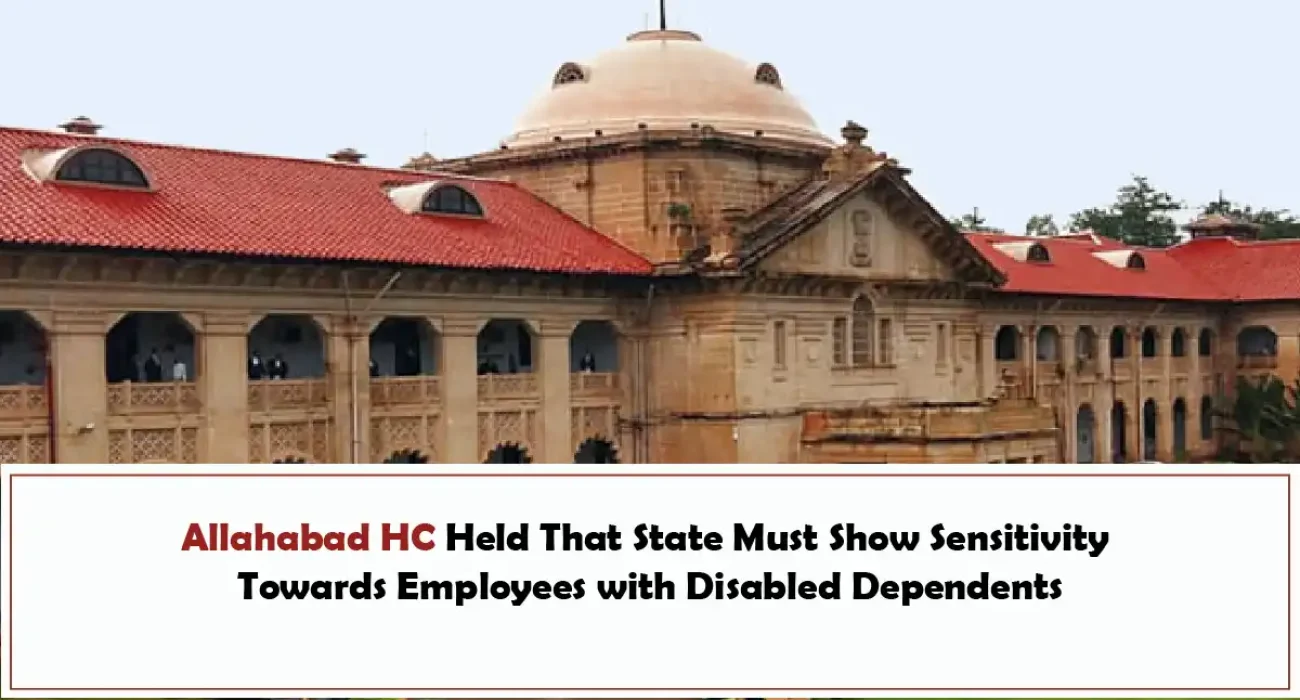

Table of Contents
ToggleThe case concerned Mr. S, a Senior Assistant in the Medical and Health Department, Uttar Pradesh. Verma had served in Ayodhya for 13 years before being transferred to Mainpuri in 2021. His son, who lives with his mother in Ayodhya, has been certified by the Government of India as suffering from mental retardation with 50% permanent disability.
Citing his son’s condition, Verma requested a transfer from Mainpuri to Ayodhya or any nearby district such as Lucknow or Ambedkar Nagar, where he could fulfil his duties as a caregiver while ensuring proper medical care for his son. The Chief Medical Officer (CMO), Mainpuri certified that there was no psychiatrist or neurophysician available in the district hospital, confirming the lack of specialized facilities for treatment. The same report also indicated that vacancies existed for the post of Senior Assistant in Lucknow and Ambedkar Nagar.
Despite these facts, on June 17, 2025, the petitioner’s request was rejected by the authorities. The reason given was that he had already served for 13 years in Ayodhya, and considering administrative exigencies and vacancies in Mainpuri, his continued posting there was deemed necessary. Aggrieved by this rejection, the petitioner approached the Allahabad High Court, challenging the order as arbitrary, insensitive, and contrary to government policy regarding employees with dependents with disabilities.
Counsel for the petitioner, Mr. Anurag Narain, argued that the impugned order suffered from a complete lack of sensitivity to the petitioner’s family circumstances. He submitted that the authorities failed to consider that the petitioner’s son’s disability is permanent and requires continuous care and an appropriate environment, not merely occasional medical treatment.
The petitioner emphasized the CMO’s certificate dated 25.03.2025, which clearly stated that no psychiatrist or neurophysician was available in Mainpuri. Moreover, Annexure-7 to the writ petition demonstrated the availability of vacancies for Senior Assistants in Lucknow and Ambedkar Nagar, where the petitioner could have been accommodated without difficulty.
The petitioner further submitted that paragraph 5(iv) of the Government Order dated 06.05.2025 explicitly exempts employees having dependents with such disabilities from routine transfers. Therefore, the rejection of his representation violated this government directive and reflected administrative apathy.
The State, through its counsel, argued that transfer is an incidence of service and that the petitioner could not claim a “choice posting”. The State maintained that administrative considerations and staffing needs required the petitioner’s continued presence at Mainpuri.
According to the counter affidavit, out of 54 sanctioned posts for Senior Assistants in Mainpuri, 20 were vacant, necessitating the petitioner’s retention. The authorities also argued that since the petitioner had already served for more than 13 years in Ayodhya, it would not be appropriate to repost him there.
Additionally, the Joint Director in the Medical and Health Services Department submitted that Mainpuri’s proximity to Agra, where the Institute of Mental Health and Hospital is located, meant that the petitioner could still access medical facilities for his son if required.
Justice Manish Mathur of the Allahabad High Court strongly criticized the government authorities for displaying what he termed “administrative insensitivity”. The Court noted that the respondents had not disputed either the petitioner’s son’s disability or the fact that there were no psychiatric or neurological specialists in Mainpuri.
The Court observed that “The authority passing the impugned order is completely unconcerned with the status of disability of petitioner’s son and is also ignorant of paragraph 5(iv) of the Government Order dated 6.5.2025 whereby persons with such disabilities were required to be exempted from transfers.”
Justice Mathur rejected the reasoning that proximity to Agra sufficed for medical care, remarking that such a stance reflected a lack of understanding of the petitioner’s son’s condition, “The deponent of the counter affidavit… is unable to draw distinction between the disability of petitioner’s son and a person who requires treatment in the Institute of Mental Health. It is a sorry state of affairs where a person posted in Medical Department is unaware of such a distinction.”
The Court stressed that the Rights of Persons with Disabilities Act, 2016 mandates not only access to medical facilities but also the creation of an appropriate environment conducive to the welfare of persons with disabilities. It observed that “In such a disability as is being undergone by petitioner’s son, it is not only medical facilities which are required but also an appropriate environment which is also required to be provided.”
The Court concluded that the reasons stated in the rejection order were clearly unsustainable and that the authorities had failed to balance administrative convenience with humanitarian considerations, especially where statutory protections for persons with disabilities were involved.
Allowing the writ petition, the Court quashed the impugned order dated June 17, 2025. It directed the Secretary, Medical Health and Family Welfare Department, Government of Uttar Pradesh, to issue appropriate orders for the petitioner’s transfer to Ambedkar Nagar, where 12 vacancies for the post of Senior Assistant were available, as per the CMO’s report dated May 16, 2025.
The Court ordered that, “Appropriate directions shall be passed within a period of two weeks from today… Learned State counsel is required to communicate this order to opposite party no. 1.” The Court scheduled the case for listing on 23.09.2025 to ensure compliance with its directions.
Written by Adv. Deeksha Rai
IAW resources
Browse our help directory